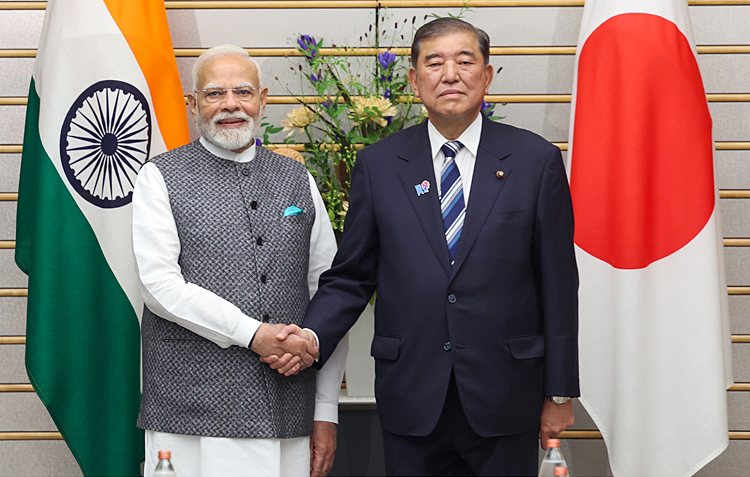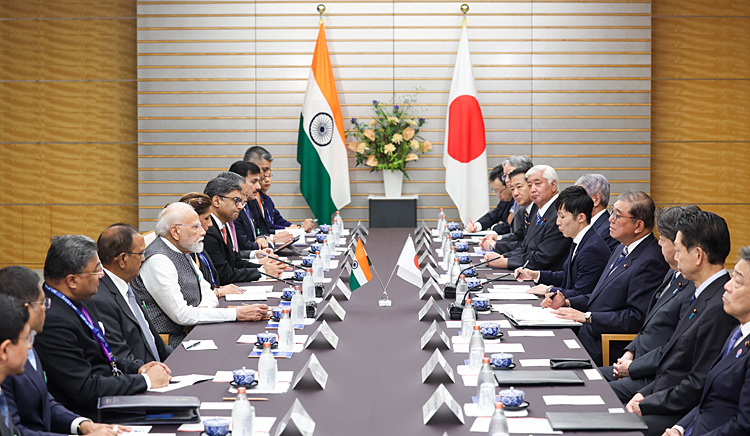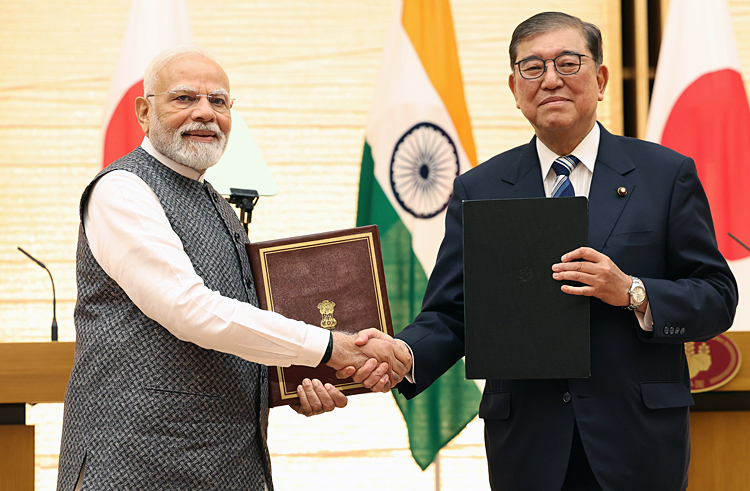INDIAN ARMED FORCES CHIEFS ON OUR RELENTLESS AND FOCUSED PUBLISHING EFFORTS

The insightful articles, inspiring narrations and analytical perspectives presented by the Editorial Team, establish an alluring connect with the reader. My compliments and best wishes to SP Guide Publications.

"Over the past 60 years, the growth of SP Guide Publications has mirrored the rising stature of Indian Navy. Its well-researched and informative magazines on Defence and Aerospace sector have served to shape an educated opinion of our military personnel, policy makers and the public alike. I wish SP's Publication team continued success, fair winds and following seas in all future endeavour!"

Since, its inception in 1964, SP Guide Publications has consistently demonstrated commitment to high-quality journalism in the aerospace and defence sectors, earning a well-deserved reputation as Asia's largest media house in this domain. I wish SP Guide Publications continued success in its pursuit of excellence.
- Operation Sindoor: Resolute yet Restrained
- India’s Operation Sindoor Sends a Clear Message to Terror and the World – ‘ZERO TOLERANCE’
- Japan and India set forth a defence cooperation consultancy framework, talks on tank and jet engines
- Terrorist Attack in Pahalgam in Kashmir: Unfolding a long surgical war against PAK
- Lt General Pratik Sharma takes over Command of Indian Army's Northern Command
Boosting India-Japan Partnership
For India, the partnership represents a significant step toward achieving manufacturing self-reliance in critical technology sectors
 |
The Author is Former Director General of Information Systems and A Special Forces Veteran, Indian Army |

Prime Minister Narendra Modi's visit to Tokyo for the 15th Annual India-Japan Summit on August 29-30, 2025, before proceeding to Japan to attend the SCO Summit at Tianjin in China, has boosted the India-Japan Special Strategic and Global Partnership to a higher level. Prime Minister Modi's discussions with Japan's Prime Minister Shigeru Ishiba, delegation level talks co-chaired by the two prime ministers, and the Joint Declaration on Security Cooperation were the highlights of the Summit.
This was Modi's first visit to Japan since May 2023. On arrival, the Indian Prime Minister was accorded a ceremonial Guard of Honour in Tokyo. India and Japan had elevated their relationship to a Special Strategic and Global Partnership a decade ago, and the new declaration further consolidates that bond.
The Joint Declaration focused on strengthening defence ties and ensuring peace and stability in the Indo-Pacific region, which both countries see as vital for their security and economic growth.
The Joint Declaration focused on strengthening defence ties and ensuring peace and stability in the Indo-Pacific region, which both countries see as vital for their security and economic growth. It provides a new framework for both nations to work together on modern-day challenges ranging from maritime safety to cyber threats. India and Japan are to expand military cooperation through more frequent joint exercises involving all three of their forces - the Army, Navy and Air Force. Both sides agreed to share defence technology and explore possibilities of jointly producing equipment. Naval cooperation will be scaled up with more ship visits, coordination to keep sea routes safe and stronger action against piracy and other crimes at sea.

The agreement goes beyond traditional defence matters including closer collaboration in areas of counter-terrorism, disaster relief, cybersecurity, defence research and cooperation on critical minerals needed for modern industries. Both countries have also committed to sharing information on new and emerging security risks. The Joint Declaration on Security Cooperation, among the key outcomes of Prime Minister Modi's Japan visit, also mentions regular dialogue between the National Security Advisors of the two countries, ensuring deeper, long-term cooperation.
The agreement goes beyond traditional defence matters including closer collaboration in areas of counter-terrorism, disaster relief, cybersecurity, defence research and cooperation on critical minerals needed for modern industries.
A statement issued by the Ministry of External Affairs (MEA) said that the Joint declaration aims at exploring opportunities to cooperate in niche areas of each other's priorities, such as counter-terrorism, peacekeeping operations and cyber defence as well as sharing information, including assessments with respect to emerging security risks. The statement described the agreement as a reflection of a "new stage" in the India-Japan partnership and said it aligns with their shared vision of a free, open, and peaceful Indo-Pacific.
Addressing the media in Tokyo, Foreign Secretary Vikram Misri, explaining the significance of the Joint Declaration, said it provides an enabling framework for both countries to respond more effectively to contemporary security challenges, adding, "An important feature of this document is the broad concept of security it embodies, which includes cooperation on cybersecurity, counterterrorism, defence industry, research and development (R&D), and closer cooperation on security issues in multilateral groupings. One of the new features of the security engagement between the two countries would be an institutionalised dialogue between the national security advisors of the two countries."
The statement described the agreement as a reflection of a "new stage" in the India-Japan partnership and said it aligns with their shared vision of a free, open, and peaceful Indo-Pacific.
During a joint briefing on August 29 after talks with his Japanese counterpart Shigeru Ishiba in Tokyo, Prime Minister Narendra Modi announced collaboration between the Indian Space Research Organisation (ISRO) and the Japan Aerospace Exploration Agency (JAXA) for the Chandrayaan-5 mission, saying, "We welcome the collaboration between ISRO and JAXA for the Chandrayaan-5 mission. Our active participation has gone beyond the limits of the earth and will become a symbol of mankind's progress in space." He also said that strong democracies are natural partners in shaping a better world. "We agree that as the two largest economies of the world and living democracies, our partnership is essential not just for the two countries but also for global peace and security," adding that the talks with Ishiba were "productive" and "purposeful".

Prime Minister Modi further said that India and Japan had established the foundation for a new chapter in their "special strategic and global partnership", and outlined a roadmap for the next decade, adding, "In the centre of our vision lie investment, innovation, economic security, environment, technology, health, mobility, people-to-people exchanges," Modi said, "We have set a goal of investment of 10 Trillion Yen from Japan in India in the next 10 years." He also said that special emphasis would be laid on connecting both countries' small and medium enterprises and startups, as well as cooperation in high technology, with a focus on semiconductors and rare earth minerals, and that both countries were moving forward with Digital Partnership 2.0 and an AI Cooperation Initiative.
The Joint Declaration provides an enabling framework for both countries to respond more effectively to contemporary security challenges.
Japan and India are reportedly moving forward with plans to transfer production of older semiconductor and LCD screen technologies from Japan to India, as both nations seek to reduce their dependence on Chinese manufacturing and strengthen economic security cooperation. According to Nikkei Asia, the initiative focuses on legacy technologies that rely on mature manufacturing tools and techniques rather than cutting-edge processes. These older semiconductors remain crucial for various applications, including voltage control in electric vehicles and inverters that improve energy efficiency in air conditioners and refrigerators. A comprehensive plan developed jointly by the Japan External Trade Organization (JETRO) and the Confederation of Indian Industry (CII) will "promote transferring the production of goods that are losing capacity in Japan due to low-priced Chinese products to India, while reorganising and expanding production capacity in India."
The scope extends beyond semiconductors to include liquid crystal displays, solar power equipment, storage batteries and compressors. Several Japanese companies are already moving forward with initiatives aligned with the transfer plan. For India, the partnership represents a significant step toward achieving manufacturing self-reliance in critical technology sectors. New Delhi hopes to develop a mass production model that combines Japanese technological expertise with Indian cost competitiveness, potentially positioning itself as an alternative manufacturing hub to China. The POTUS Donald Trump's tariffs tsunami has further boosted the partnership between India and Japan.





